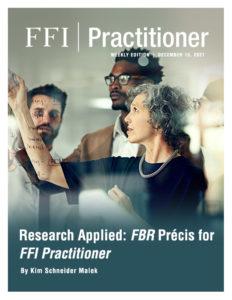
View this edition in our enhanced digital edition format with supporting visual insight and information.
Thank you to this week’s contributor, Kim Schneider Malek, for her précis of “Over My Dead Body”: Wives’ Influence in Family Business Succession.” The article appears in the December 2021 issue of FBR. In the précis, Kim provides a summary of the research and key findings, and explores the practical implication of the research for families, advisors, and researchers in the field.
Introduction
There are many multidimensional influences on family business succession. Some are more quantitative and outwardly valued than others. These might be centered around measurable decisions such as who owns, controls, and leads today vs. who will own, control, and lead in the future. Other influences remain more complex and less visible. These might include who and what influences a family business’ incumbents to embark on succession, how incumbents might be persuaded to exit a family business gracefully, how they might resist transitions, and who might be a significant influence on successor candidates throughout their lives and the lifespan of the family business.
One such powerful influence on family business succession is that of the incumbent’s wife, or the mother of the successor candidate. When using a gender lens to explore the deep-rooted and systemic socialization impact that wives have on family business succession, we enrich our understanding of how to navigate forward as practitioners. This understanding provides advisors with knowledge, a resource for framing client families’ perceptions, and necessary additional questions.
Theory, Hypothesis, and Research
In this article and through their research endeavors, the authors seek to shed light on wives’ influence on family business succession by intentionally looking through a gender lens rather than at a non-gendered role (spouse) lens. This allows them to form a social construct and blueprint for comparisons.
The authors of this small quantitative research initiative draw on 34 in-depth interviews of wives from a variety of Australian family businesses. They then studied the existing research on socialization of families, vocation choice of children, and changing roles of wives through a variety of filters.
They organized and analyzed their data to highlight three contributions:
- Wives have critical influence through socialization across the lifespan of the business, specifically through normative, interactive, and experiential socialization.
- Wives profoundly influence their children’s vocational choices through advice, encouragement, and role modeling, thus impacting family business continuity.
- Wives have an amplified influence on family business succession because of the changing expectations and interpersonal dynamics of marriage and family life. They influence succession through giving advice and encouragement as well as role-modeling at home and at work.
The authors seek to expand the understanding of wives’ roles in, and influences on, family business succession beyond stereotypes and tokenism. Wives’ influence in this area gives them leverage and power. They can influence in a positive way, in a neutral way, or in a disruptive way, simply by their role as mother and wife (not spouse). This framing of the research helps practitioners to see how wives take responsibility for succession planning and children’s involvement in the business. Previous research has not examined the impact of wives’ influence specifically, but simply at the positive influence of spouses. Previous research also did not include the changing expectations of equality in decision making.
Findings
Their data collection, organization, and analysis resulted in grouping the findings into three perspectives on socialization theory (normative, interactive, and experiential), categorizing four typologies based on engagement and involvement, manifesting six social practices (taxonomies), and concluding with four resulting categorical types of wives who influence family business succession.
A master summary of all of these follows.
Normative Socialization
Normative socialization is manifested through immersion, activities that immerse children in the business from an early age.
Interactive Socialization
Interactive socialization is manifested by three practices: facilitation, extension, and support. Facilitation of children’s involvement is demonstrated by wives and mothers by creating protocols and other forms of family governance. Extension refers to activities that extend children’s capabilities through the business, such as offering new responsibilities and challenges. Support refers to activities that support children in navigating business-like career advice and flexible work arrangements.
Experiential Socialization
Experiential socialization refers to marital dynamics such as wives’ attitudes toward succession and toward the notion that their children have a choice of career, free of the imperative to join the family business.
The four categories of ideal types1 are Pioneers, Doubter, Traditionalists, and Disruptors.
Pioneers
Pioneers bring new leadership styles to the charge of preparing the family for the future. They embrace strong encouragement, and they actively demonstrate strong involvement. They believe in active choice for their children rather than passive obligations. They also give comprehensive attention to children’s integration into the business.
Doubters
A second ideal type is Doubters. These wives create ambivalence in the shadow of the patriarch. They provide weak encouragement but are strongly involved. They are concerned about the restrictions placed on children when they join business under the authority of the patriarch. They bring an inherent resistance to the succession process because of these concerns.
Traditionalists
A third ideal type is Traditionalists, who express complicity with traditional expectations of wives and mothers. While they, likely in-laws, are not actively involved in the multi-generational family enterprise, they demonstrate a strong encouragement of their family members and offer a great deal of moral support for their children to get involved. They may, however, struggle to find a voice in business decisions, even though they ensure continuity and succession through driving at least one child into the business. Traditionalists play a critical but invisible “peacemaker” role in family business succession.
Disruptors
The final ideal type is the Disruptor, who resists her children’s participation in the business, both active and passive. They are classified by weak encouragement and weak involvement. They are likely married in and don’t encourage their children to go into the family enterprise or to have any immersive experiences in it. They don’t facilitate their children’s involvement, lend support, or extend their capabilities. They want their own children exposed both to the universe of possibilities elsewhere and to limitations of staying within the family business.
Contributions to Practice
Practitioners committed to action research and systemic thinking will benefit beyond just acquiring perspective and knowledge about wives’ influence and invisibility in family business succession. The authors organize and analyze data into a framework that will help increase advisors’ awareness and avoid falling prey to the simple convenience of accepting the invisibility of family business wives in succession choice, or to the frustrating outcome of the potential influence destroying a family business succession deal with a final-hour declaration, “Over my dead body!”
This gender lens needs to be in the family business succession kaleidoscope from the very start, as well as in the discovery and inquiry phase. Practitioners need to understand that every dollar, decision, and dynamic has a socialization dimension to it, and therefore, wives will have influence on this dimension. Here are a few suggested practice ideas resulting from this research:
- Enhance the intake interview questionnaire to include questions to explore and gain insight into the socialization of the succession family, relative to normative, interactive, and experiential influences.
- Create and distribute a socialization survey to involved family members and create a report for the feedback phase of the engagement.
- During the discovery phase, collectively create a family decision influencers’ map. Then, superimpose a map of the family’s perceived invisible forces that they believe influence family decision making. Then, ask family members what is uniquely gendered about their results and why.
- Create an assessment tool (such as a Family Business Success Ecosystem Influences tool) so that family members can evaluate from the same perspectives relative to influence, dynamics, decisions, and consider the ways in which behaviors might have unintended consequences.
Footnote
1The phrase “ideal type” was coined by sociologist Max Weber and refers to categories that are not strictly realistic, but that are abstracted enough to allow for classification and clearer points of comparison (Weber, 1922/1978).
Reference
Weber, M. (1978). Economy & Society. University of California Press. (Original work published 1922)
About the Contributor

Kim Schneider Malek, FFI Fellow, is a twenty-five-year, second-generation practitioner advancing family enterprise through consulting, facilitation, and education. A former GEN faculty member, past member of the Body of Knowledge committee, and co-founding editor of FFI’s online publication, FFI Practitioner, Kim received the 2014 Barbara Hollander Award for leadership and educational contribution to the field. Kim is the founder president of Family Enterprise Alliance, LLC, a global consulting firm, director of the Bailey Program for Family Enterprise, and an assistant professor of the practice at the University of Denver Daniels College of Business where she has been teaching since 2001. She can be reached at [email protected] or [email protected].

View this edition in our enhanced digital edition format with supporting visual insight and information.





